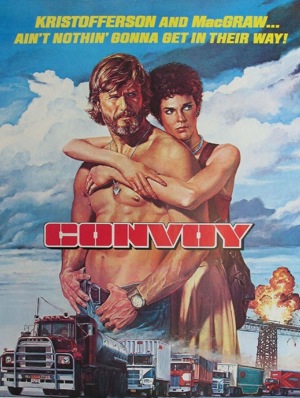Our Classic Film Series screens Monday and Wednesday nights at 7:30 pm at the Portage Theater on 4050 N. Milwaukee Ave. The schedule is also available through Google Calendar.
Admission is always $5.
Programmed and Projected by Julian Antos, Becca Hall, and Kyle Westphal
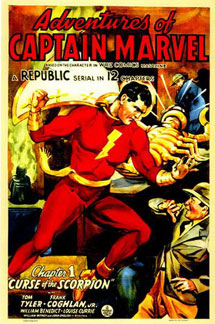
———
BEFORE THE FEATURE
Adventures of Captain Marvel
Directed by William Witney and John English • 1941
Although he hasn’t seen a blockbuster reboot in recent years, Captain Marvel was the most popular comic book superhero of the 1940s, easily eclipsing Batman and Superman in sales. A hand-me-down Man of Steel with a lightning bolt on his chest, Captain Marvel was also the first comic book hero transplanted to cinema. This 1941 serial from Republic’s most dynamic auteurs, William Witney and John English, begins with Marvel’s origin story (he’s granted super powers from a wizard in Siam during an archeological expedition) and winds its way chapter-by-chapter, climax-by-climax to the unmasking of archvillain Scorpion. We’re presenting Captain Marvel in its entirety in 35mm before a dozen features this season. You’ll be hooked before you can say Shazam!
———
Wednesday, January 2 @ 7:30pm
SOME LIKE IT HOT
Directed by Billy Wilder • 1959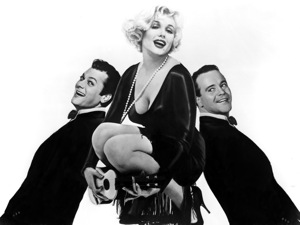
Some Like It Hot begins with a fake funeral and concludes with preparations for a sham wedding, and in between no social convention escapes open ridicule. Part gangster drama, part bosomy musical, but thoroughly a sex farce driven by very serious ideas about conformity and freedom, Some Like It Hot remains beloved the world over. After Chicago speakeasy saxophonist Tony Curtis and bass player Jack Lemmon accidentally witness the St. Valentine’s Day Massacre, the duo are left with a choice: abscond to Urbana for a college dance, or catch the train to Florida with Sweet Sue and Her Society Syncopators. The only hitch: Sweet Sue’s is an all-girl outfit. So far so good, but how does a man masquerading as a woman seduce hard-drinking ukulele goddess Marilyn Monroe? Suffused with Wilder’s blunt émigré’s suspicion of genteel institutions (what other film would out the Friends of Italian Opera as a mob front?), Some Like It Hot shares with its radical cousin Glen or Glenda a pervasive and deeply affecting sense that gender is a scam. The fact that Curtis and Lemmon’s half-assed, haggish drag act proves sexually irresistible to half the state of Florida is one of this comedy’s more corrosive aspects. (KW)
122 min • United Artists • 35mm from Park Circus
Cartoon: Bugs Bunny in “The Big Snooze” (Robert Clampett, 1946) – 16mm – 7 min
Wednesday, January 9 @ 7:30pm
THE WALLS OF JERICHO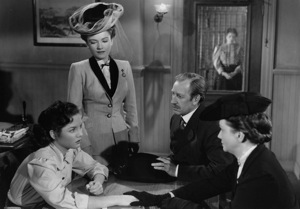
Directed by John M. Stahl • 1948
In Jericho, Kansas at the turn of the century, county lawyer Cornel Wilde endures endless suffering and public humiliation at the hands of his drunken wife (Ann Dvorak) while trying to spur a hopeless romance with Anne Baxter. Their affair is repressed in an effort to preserve Wilde’s fledgling political career, which is effectively destroyed by Linda Darnell when Wilde rejects her advances. Based on Great Plains novelist Paul Wellman’s long out-of-print (but reportedly fantastic) book of the same name, The Walls of Jericho lies somewhere between director John M. Stahl’s nasty, writhing Leave Her to Heaven and his devastating melodramas (the original versions of Magnificent Obsession, Imitation of Life, and Back Street). A seething Southern fable simultaneously touching and disturbing, Jericho‘s sinister way of displaying a crumbling town and stilted way of communicating with its audience have a lingering, cumulative effect that crawls under the skin. (JA)
106 min • 20th Century-Fox • 35mm from Criterion Pictures, USA
Serial: Captain Marvel: “Curse of the Scorpion” (John English & William Witney, 1941) – 35mm – 30 min
Wednesday, January 16 @ 7:30pm
DESIRE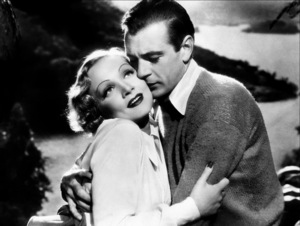
Directed by Frank Borzage • 1936
During Ernst Lubitsch’s ill-fated tenure as production chief at Paramount, he supervised some sixty pictures, but signed only one: Desire, a continental romantic comedy of the highest order. Gary Cooper stars as a breezily laconic American auto designer whose Spanish vacation is ruined when Marlene Dietrich decides to flirt, steal his car, and promptly drive it over a cliff. She’s an expert jewel thief who plans only to use Cooper as mule for smuggling a necklace across the border but winds up falling for the dope, who is, after all, both a good mechanic and an endearingly not-good singer. (If Lubitsch’s objective was partly to bring the Dietrich persona back down to Earth after the back-to-back box office failures of The Scarlet Empress and The Devil is a Woman, then he couldn’t have chosen a more demonstrative turnabout than her giddy anticipation of becoming a Detroit housewife.) What begins as a stridently Lubitschian exchange of cynical repartee soon melts into a world of sincere, carnal immediacy only possible through the unabashed romanticism of Frank Borzage. (KW)
96 min • Paramount Pictures • 35mm from Universal
Serial: Captain Marvel:“The Guillotine” (John English & William Witney, 1941)- 35mm – 16 min
Monday, January 21 @ 7:30pm
GUNMAN’S WALK
Directed by Phil Karlson • 1958
Scripted by Frank Nugent (The Searchers), 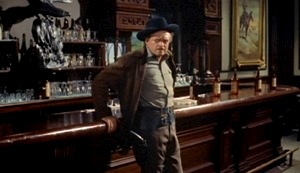 Gunman’s Walk stars Tab Hunter as the drunken, gunslinging son of lawless rancher Van Heflin, and James Darren as his polar opposite brother, a dark, brooding pacifist in love with half-Indian Kathryn Grant. Better known for bitter neorealist noirs like 99 River Street and The Phenix City Story, Chicago-born Phil Karlson returned to his B-western roots with Gunman’s Walk. Shot in color and blazing CinemaScope, Karlson traded in his talent for restraint without losing any impact, gaining a startlingly beautiful view of Tuscon, Arizona and an incredible chase scene between Tab Hunter and a white mare. Per the director, “When I do color, I think in terms of black and white … we know that blood’s going to be awfully red and it’s going to be pretty disgusting when they see it.” The often uneven Tab Hunter is a revelation here, and Gunman’s Walk is as good a western as it is a broken family drama. Home video rights on this title are perpetually held up, so this may very well be your only chance to see the film. (JA)
Gunman’s Walk stars Tab Hunter as the drunken, gunslinging son of lawless rancher Van Heflin, and James Darren as his polar opposite brother, a dark, brooding pacifist in love with half-Indian Kathryn Grant. Better known for bitter neorealist noirs like 99 River Street and The Phenix City Story, Chicago-born Phil Karlson returned to his B-western roots with Gunman’s Walk. Shot in color and blazing CinemaScope, Karlson traded in his talent for restraint without losing any impact, gaining a startlingly beautiful view of Tuscon, Arizona and an incredible chase scene between Tab Hunter and a white mare. Per the director, “When I do color, I think in terms of black and white … we know that blood’s going to be awfully red and it’s going to be pretty disgusting when they see it.” The often uneven Tab Hunter is a revelation here, and Gunman’s Walk is as good a western as it is a broken family drama. Home video rights on this title are perpetually held up, so this may very well be your only chance to see the film. (JA)
97 min • Columbia Pictures • 35mm Vault Print from Sony Pictures Repertory
Serial: Captain Marvel: “Time Bomb” (John English & William Witney, 1941) – 35mm – 17 min
Wednesday, January 23 @ 7:30pm
BREAKING AWAY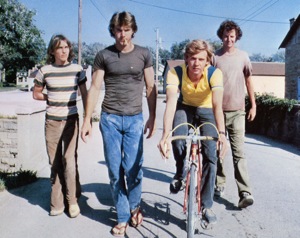
Directed by Peter Yates • 1979
Dennis Christopher, Dennis Quaid, Daniel Stern, and Jackie Earle Haley are four Bloomington townies on the brink of adulthood, adamantly putting off going to college (expensive), joining the army (dangerous), or going to work (i.e., selling used cars). Bitterly opposed to the privileged social elite at Indiana University, Dennis Christopher enters the annual ‘Little Indy’ cycling race as an act of defiance and falls head over heels for IU undergraduate Robyn Douglas, masquerading as an Italian foreign exchange student to win her over. Peter Yates (Bullitt, The Friends of Eddie Coyle) directed an Oscar-winning semi-autobiographical script by Yugoslavian-born Steve Tesich, who moved to Bloomington when he was 13 and won the Little 500 bicycle race of 1962. The film has the kind of sweet, unsentimental outlook that people like Studs Terkel saw in America and, per Time Out-London, “went out of fashion with [Howard] Hawks.” Breaking Away deals with class issues and coming of age in a way that movies no longer think to do (and even in 1979 a film like Breaking Away was an exception to the rule) and in 2013 is just as relevant. (JA)
101 min • 20th Century Fox • 35mm Vault Print from Fox
Serial: Captain Marvel: “Death Takes the Wheel” (John English & William Witney, 1941) – 35mm – 16 min
Wednesday, January 30 @ 7:30pm
THE FLYING ACE
Directed by Richard E. Norman • 1926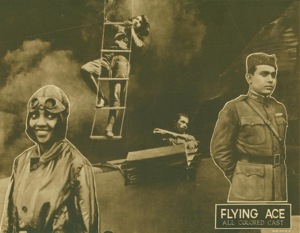
With live organ accompaniment by Jay Warren!
Jacksonville, Florida was once “The Winter Film Capital of the World,” providing year-round sunlight to beleaguered East Coast moviemakers. By 1926, most production had decamped to Hollywood, but the Norman Film Manufacturing Company remained, making low-budget “race films” for exhibition in segregated theaters across America. White entrepreneur-director-distributor Richard E. Norman lured noted Harlem actor Lawrence Criner to Jacksonville for the title role in The Flying Ace, an aviation drama with an explicit agenda of racial uplift. Criner stars as Captain Billy Stokes, a World War I hero who turns detective when the railroad paymaster goes missing. It’s a measure of The Flying Ace’s effectiveness as a tried-and-true crowd-pleaser that we don’t even care that Norman skimped on the aerial stunts, with all the flying sequences playing out against a hastily painted sky. Beautifully restored by the Library of Congress, this vital piece of regional cinema will leave you giddy. (KW)
65 min • Norman Film Manufacturing Co. • 35mm from the Library of Congress
Serial: Captain Marvel: “The Scorpion Strikes” (John English & William Witney, 1941) – 35mm – 16 min
Wednesday, February 6 @ 7:30pm
LILITH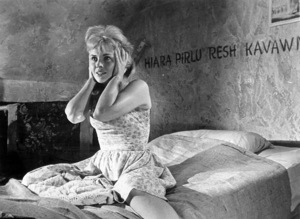
Directed by Robert Rossen • 1964
After the critical and box office success of The Hustler, writer-director Robert Rossen could have made any film he wanted. He chose this deeply private psychological drama, a near-clinical treatise that regards love as an essentially irrational experience. Jean Seberg delivers a career performance as Lilith, the schizophrenic woman whose advanced withdrawal from society extends to the invention of her own language. After neophyte occupational therapist Warren Beatty makes a breakthrough with the young patient, he finds himself happily seduced by her assertive personality. But Lilith is a mad siren, using her sexuality to seed the world with primal trauma. Described by Dave Kehr as “a masterpiece . . . conceived in shades of white so delicate and elusive that the picture barely seems to brush the screen,” Lilith makes sunlight as unnerving as shadow. Co-stars Kim Hunter, Peter Fonda, and Gene Hackman in his first credited role. (KW)
114 min • Columbia Pictures • 35mm Vault Print from Sony Pictures Repertory
Serial: Captain Marvel: “Lens of Death” (John English & William Witney, 1941) – 35mm – 16 min
Wednesday, February 13 @ 7:30pm
DRÁCULA
Directed by George Melford • 1931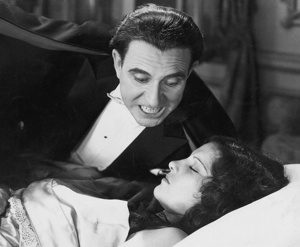
During late evenings in the winter of 1930, presumably while Bela Lugosi and Tod Browning were tearing up Hollywood and Vine or fast asleep, something strange and sexy was happening on the Universal Backlot: Spanish-illiterate George Melford, a translator, and a Spanish-speaking cast were filming a version of Dracula with lower cut dresses and more rats. During the early days of sound, the practice of shooting multiple-language versions of the same film for foreign export was fairly common, using the same sets and production schedule, the process could be streamlined quite easily. Sadly, the Spanish-language Dracula is one of the few of these films that survive (Laurel & Hardy’s La Vida Nocturna & Politiquerias are among others); if the rest of them are half as good as this, then we’ve lost a significant chunk of cinema history, not just curiosities. Carlos Villarías plays Drácula, though it should be noted that Lugosi couldn’t speak very good English either. (JA)
In Spanish with English subtitles
101 min • Universal Pictures • 35mm from Universal
Serial: Captain Marvel: “Human Targets” (John English & William Witney, 1941) – 35mm – 17 min
Monday, February 18 @ 7:30pm
BRING ME THE HEAD OF ALFREDO GARCIA
Directed by Sam Peckinpah • 1974
Living at the end of his rope, small town 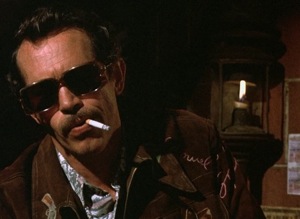 piano player and bar manager Warren Oates is offered $10k by two bounty hunters for the head of Mexican outlaw Alfredo Garcia. Oates takes the offer, hoping to secure a better life for himself and his new fiancée Elita (Isela Vega). Inspired in great part by John Huston’s Treasure of the Sierra Madre, Peckinpah’s story of unadulterated desperation was met with equal doses of critical and commercial rejection. By 1974, violence in American cinema had been tacitly embraced by critics and audiences alike. This was the year of box office heavyweights The Godfather Part II ($57m) and Texas Chain Saw Massacre ($31m), yet somehow Alfredo Garcia ($2m) was trashed by nearly every American critic other than Roger Ebert, who wrote that he could “feel Sam Peckinpah’s heart beating and head pounding in every frame.” In an era when Hollywood seemed more and more emotionally detached, Alfredo Garcia emerged gut-wrenchingly personal. It’s now recognized as one of the most important (and rewarding) films of the ‘70s. This screening will be introduced by our friend and Peckinpah historian Steven Lloyd, who contributed to the recently published Peckinpah Today. (JA)
piano player and bar manager Warren Oates is offered $10k by two bounty hunters for the head of Mexican outlaw Alfredo Garcia. Oates takes the offer, hoping to secure a better life for himself and his new fiancée Elita (Isela Vega). Inspired in great part by John Huston’s Treasure of the Sierra Madre, Peckinpah’s story of unadulterated desperation was met with equal doses of critical and commercial rejection. By 1974, violence in American cinema had been tacitly embraced by critics and audiences alike. This was the year of box office heavyweights The Godfather Part II ($57m) and Texas Chain Saw Massacre ($31m), yet somehow Alfredo Garcia ($2m) was trashed by nearly every American critic other than Roger Ebert, who wrote that he could “feel Sam Peckinpah’s heart beating and head pounding in every frame.” In an era when Hollywood seemed more and more emotionally detached, Alfredo Garcia emerged gut-wrenchingly personal. It’s now recognized as one of the most important (and rewarding) films of the ‘70s. This screening will be introduced by our friend and Peckinpah historian Steven Lloyd, who contributed to the recently published Peckinpah Today. (JA)
112 min • United Artists • 35mm from Park Circus
Cartoon: “Behind the Meat-Ball” (Frank Tashlin, 1945) – 16mm – 8 min
Wednesday, February 20 @ 7:30pm
THE THIRD DEGREE
Directed by Michael Curtiz • 1926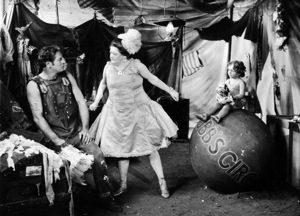
With live organ accompaniment by Jay Warren!
Dolores Costello stars as a Coney Island trapeze artist whose marriage to playboy Jason Robards triggers a cascade of familial betrayal, murder, and false confessions in the American debut of future Casablanca director Michael Curtiz. Already a veteran of some sixty films in Europe, Hungarian émigré Curtiz (née Mihály Kertész) arrived in Hollywood in 1926 and immediately set about establishing himself as the most dogged and versatile filmmaker on the Warner Bros. lot. His first assignment was hardly promising: a 1908 stage melodrama pivoting on the novelty of police brutality that had already been filmed twice before. Shifting the play’s main action to a circus and finding the slightest pretext for an endless parade of elaborate camera movements and wild superimpositions, Curtiz and cameraman Hal Mohr made a film that earned favorable comparison to recent German imports like Variety. “I do not see a scene with my eyes,” claimed Curtiz, “I see a scene with camera-eyes.” (KW)
85 min • Warner Bros. • 35mm from the Library of Congress
Serial: Captain Marvel: “Boomerang” (John English & William Witney, 1941) – 35mm – 17 min
Wednesday, February 27 @ 7:30pm
HOLD BACK THE DAWN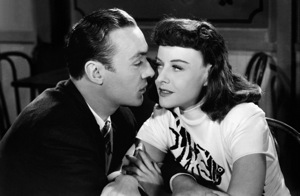
Directed by Mitchell Leisen • 1941
Finding his raucous European playground inelegantly transformed into a war zone, Romanian dancer and gigolo Charles Boyer sets out for America; he gets as far as Mexico, denied entry to the US on the basis of an antiquated quota system. After resigning himself to a lifetime in the Esperanza flophouse, Boyer learns from ex-lover Paulette Goddard that an entrance visa is just a marriage license away. Setting his sights on mousy American school teacher Olivia DeHavilland, Boyer discovers the perils and rewards of citizenship and true love, in that order. Unfairly denigrated by co-writer Billy Wilder as the movie that prompted him to become a director (he harbored lifelong resentment towards Mitchell Leisen when he acceded to Boyer’s request to cut a melancholic, one-sided conversation with a cockroach), Hold Back the Dawn requires no apology. A romantic melodrama blessed with acid wit or perhaps a farce that cannot help but reflect the seriousness of its historical moment, it remains a singular treasure. (KW)
116 min • Paramount Pictures • 35mm from Universal
Serial: Captain Marvel: “Dead Man’s Trap” (John English & William Witney, 1941) – 35mm – 16 min
Wednesday, March 6 @ 7:30pm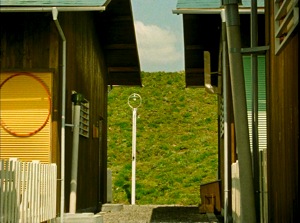
GOOD MORNING [OHAYÔ]
Directed by Yasujiro Ozu • 1959
In a small westernized suburb in Japan, two brothers go on strike at home and school in an effort to get their parents to buy them a television set to watch sumo wrestling. An Eastern answer to Douglas Sirk’s 1950s melodramas from the master of melodrama itself, this loose remake of Ozu’s I Was Born, But… is filled with nosy neighbors and characterized by a gorgeous pastel Agfacolor palette. While Good Morning is a slight departure from Ozu’s usual heavier material, it’s also a gentle critique of ready-made 1950s culture permeating both hemispheres, suggesting that the only thing more ridiculous than its two heroes pining for a TV set and their overextended fart jokes (fair warning) is the way this new breed of postwar grown-ups tiptoe around saying what they really feel. (JA)
In Japanese with English subtitles
94 min • Shochiku • 35mm from Janus Films
Serial: Captain Marvel: “Doom Ship” (John English & William Witney, 1941) – 35mm – 16 min
Wednesday, March 13 @ 7:30pm
FLAMING STAR
Directed by Don Siegel • 1960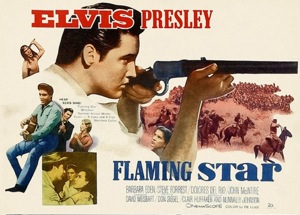
Elvis Presley sings two songs in the first reel of Flaming Star, but don’t mistake this hard-edged Western for a musical. Half-breed Pacer Burton (Presley) doesn’t have much to croon about after a neighboring family is massacred by local war chief Buffalo Horn. The settlers question the loyalty of Pacer’s Kiowa mother (Dolores Del Rio!) and fan the flames of race hate. Best known today as the source of the six-guns production still that Andy Warhol appropriated for his canvas Double Elvis, Flaming Star is actually already a thoroughly pop creation with sincere progressive ideas. Siegel’s crisp action film suggests The Searchers in reverse: while the Ford-Wayne bigotry-renouncing classic inspired Buddy Holly to pen “That’ll Be the Day,” Flaming Star begins with an irresistible rockabilly hook and proceeds to spin a harrowing account of a frontier society thoroughly undone by ethnic division. As Variety observed, “Flaming Star has Indians-on-the-warpath for the youngsters, Elvis Presley for the teenagers and socio-psychological ramifications for adults who prefer a mild dose of sage in their sagebrushers.” (KW)
92 min • 20th Century-Fox • 35mm Vault Print from Fox
Serial: Captain Marvel: “Valley of Death” (John English & William Witney, 1941) – 35mm – 16 min
Monday, March 18 @ 7:30pm
PARK ROW
Directed by Samuel Fuller • 1952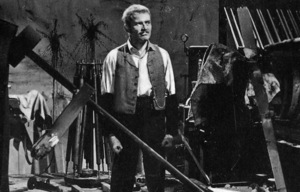
After being fired from New York newspaper The Star for criticizing its corrupt SOPs, Gene Evans takes his life savings and starts The Globe with the assistance of veteran journalist Herbert Heyes. Star heiress Mary Welch sets out to destroy The Globe, but Evans is relentless. As the story goes, Sam Fuller brought up Park Row with 20th Century Fox production head Darryl Zanuck after convincing him to shoot two rounds of ammunition off the walls of Fox’s screening room to prove that bullets really ricocheted off cement walls like in Fixed Bayonets! Zanuck loved the script, but proposed the picture be shot in color and star Gregory Peck and Susan Hayward. It could even be a musical. “To hell with Zanuck and Fox!” said Fuller, and funded the whole thing himself. Park Row was his $200,000 gift to American journalism and a war movie with printing presses for ammunition. (JA)
83 min • Samuel Fuller Productions thru United Artists • 35mm from Park Circus
Serial: Captain Marvel: “Captain Marvel’s Secret” (John English & William Witney, 1941) – 35mm – 16 min
Cartoon: Bugs Bunny in “Baseball Bugs (Friz Freleng, 1946) – 16mm – 8 min
Wednesday, March 20 @ 7:30pm
ONLY ANGELS HAVE WINGS
Directed by Howard Hawks • 1939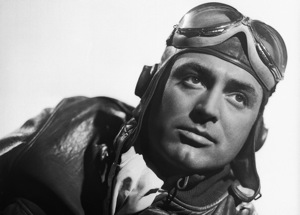
Night after night Cary Grant and his dog-eared group of fliers plunge into the stormy Peruvian Andes to deliver the mail, nitroglycerin, or whatever else is tossed off the back of the truck. The trip is long and cold and wet and lonesome, the airplanes are in terrible condition, the weather is often so bad that birds won’t leave the ground, and the job itself is so ridiculously dangerous that death is almost inevitable. Few films with such a strong sense of mortality are able to handle it with the surefooted grace of Only Angels Have Wings, one of Howard Hawks’ most expressive and visceral efforts, and an extremely touching portrait of man and machine. Jean Arthur plays Bonnie Lee, a piano player on a Peruvian layover who gradually falls for Grant despite his ignorantly suicidal tendencies. With Thomas Mitchell, Richard Barthelmess, and Rita Hayworth in her first starring role, plus a Hamilton Metalplane, Ford Trimotor and Pilgrim Model 100-B. (JA)
121 min • Columbia Pictures • 35mm Vault Print from Sony Pictures Repertory
Cartoon: Popeye the Sailor in “I Never Changes My Altitude” (Fleischer Studios, 1937) – 16mm – 6 min
Wednesday, March 27 @ 7:30pm
CITY OF FEAR
Directed by Irving Lerner • 1959
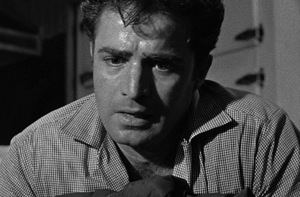 A bargain-basement film noir that locates downbeat nightmares in the stucco bungalows of working-class Los Angeles, City of Fear is a tense, atomic-age white knuckler. Following up their hepcat hit man saga Murder by Contract, director Irving Lerner and actor Vince Edwards craft another B-picture suffused with seedy, West Coast nihilism. (A filmmaker who cut his teeth on projects for the left-wing Film & Photo League in the 1930s, Lerner had a mysterious and knotty career, which will be further illuminated by two documentary shorts preceding the feature.) Edwards plays a San Quentin escapee with nothing but a thermos of pure heroin to his name; in fact, he’s unwittingly shepherding a canister of radioactive Cobalt-60 that could level the city. As the police dragnet led by no-nonsense genre mainstay Lyle Talbot tightens, the isolated Edwards delivers a kind of total performance—a pumice-faced, poor man’s Burt Lancaster with a laggard body. Features superb off-the-cuff location photography from Lucien Ballard and an early jazz score by maestro Jerry Goldsmith. (KW)
A bargain-basement film noir that locates downbeat nightmares in the stucco bungalows of working-class Los Angeles, City of Fear is a tense, atomic-age white knuckler. Following up their hepcat hit man saga Murder by Contract, director Irving Lerner and actor Vince Edwards craft another B-picture suffused with seedy, West Coast nihilism. (A filmmaker who cut his teeth on projects for the left-wing Film & Photo League in the 1930s, Lerner had a mysterious and knotty career, which will be further illuminated by two documentary shorts preceding the feature.) Edwards plays a San Quentin escapee with nothing but a thermos of pure heroin to his name; in fact, he’s unwittingly shepherding a canister of radioactive Cobalt-60 that could level the city. As the police dragnet led by no-nonsense genre mainstay Lyle Talbot tightens, the isolated Edwards delivers a kind of total performance—a pumice-faced, poor man’s Burt Lancaster with a laggard body. Features superb off-the-cuff location photography from Lucien Ballard and an early jazz score by maestro Jerry Goldsmith. (KW)
75 min • Columbia Pictures • 35mm Vault Print from Sony Pictures Repertory
Shorts: “Muscle Beach” (Joseph Strick & Irving Lerner, 1948) – 35mm – 9 min and “A Place to Live” (Irving Lerner, 1941) – 16mm – 17 min – Both shorts preserved by the Academy Film Archive
Wednesday, April 3 @ 7:30pm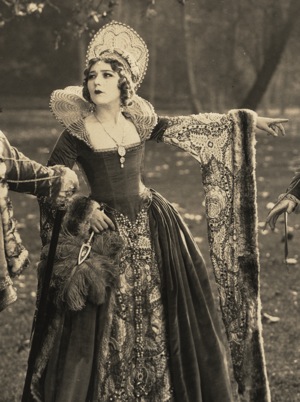
DOROTHY VERNON OF HADDON HALL
Directed by Marshall Neilan • 1924
With live organ accompaniment by Jay Warren!
Introduced by film scholar Christel Schmidt, who will sign copies of her new book, Mary Pickford: Queen of the Movies, following the screening.
Mary Pickford wanted to grow up, and so she embarked on a spate of “adult” projects with unimpeachable credentials. America’s Sweetheart showed her (mildly) naughty side in Ernst Lubitsch’s American debut, Rosita, and followed it with Dorothy Vernon of Haddon Hall, an elaborate sixteenth-century drama adapted from a popular novel by Charles Major that boasts exquisite photography from Pickford’s regular cameraman, Charles Rosher, and an armada of authentic (and expensive!) costumes designed by future director Mitchell Leisen. Pickford stars as Dorothy, the headstrong daughter of a noble family with no interest in abiding by a betrothal to her hapless cousin. Instead, she has her eyes on Allan Forest, the son of a rival house (and, in real life, Pickford’s own brother-in-law, so doubly forbidden fruit). Familial strife soon gives way to court intrigue (it’s not every thwarted marriage that arouses the enmity of Queen Elizabeth and Mary Queen of Scots) and scenes of galloping derring-do that rival the work of Douglas Fairbanks. (In fact, film historian Kevin Brownlow has speculated that Fairbanks stood in for his wife for a few of Dorothy Vernon’s more difficult stunts!) A tremendously personal project for Pickford, she even directed a few scenes herself when Marshall Neilan proved too drunk to hold up the reins. Received indifferently by an American public that pigeon-holed Pickford as an eternal juvenile and later dismissed and buried by Pickford herself, Dorothy Vernon has been difficult to re-evaluate. Finally restored by Belgium’s Cinémathèque Royale from complementary French and Russian nitrate copies, with English intertitles recreated through the assistance of the Academy Film Archive, Dorothy Vernon cries out for rediscovery. (KW)
Presented in conjunction with Library of Congress and the Silent Film Society of Chicago
120 min • United Artists • 35mm from Cinémathèque Royale de Belgique
Wednesday, April 10 @ 7:30pm
THE BIGAMIST
Directed by Ida Lupino • 1953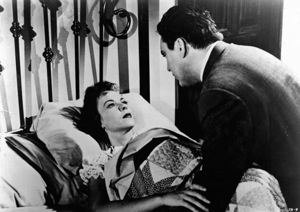
Perpetually typecast as a noir floozy, Ida Lupino knew that the only way to see serious social dramas on screen was to make them herself. Forming a small production company with her husband Collier Young, Lupino embarked on a series of topical films. All had exploitation-ready storylines, but Lupino and Young took a more guarded, liberal approach to their material. By the time of The Bigamist, Lupino and Young had divorced and remarried other people, but continued their business relationship. Poignantly, The Bigamist stars both Lupino and Young’s new wife, Joan Fontaine, as two very different poles of femininity. Arch career woman Fontaine just can’t provide the domestic comfort that her husband Edmond O’Brien desires, leaving the wannabe family man to seek affection from earthy hostess Lupino. Not wanting to hurt either woman, bigamy emerges as O’Brien’s most humane option. The Bigamist has developed a subterranean reputation through poor-quality prints and bootleg videos, but thanks to UCLA’s sterling restoration, it’s resurrected as an impossibly sensitive treatment of the constraints of gender and society in the ’50s. Preservation funded by The Film Foundation and the Hollywood Foreign Press Association. (KW)
79 min • The Filmakers • 35mm from UCLA Film and Television Archive
Cartoon: Daffy Duck in “The Henpecked Duck” (Robert Clampett, 1941) – 16mm – 7 min
Monday, April 15 @ 7:30pm
CITY STREETS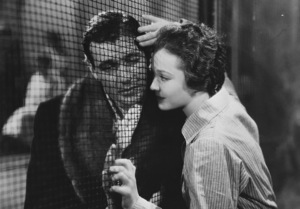
Directed by Rouben Mamoulian • 1931
Then better known for westerns like The Virginian and The Spoilers, Gary Cooper is a marksman for a traveling carnival who takes up with Sylvia Sydney, a bootlegger’s daughter. When Sydney’s father (inexplicably but superbly played by future character actor Guy Kibbee) lands her in jail for a murder he committed, he convinces straight-shooting Cooper to join the mob to help get Sydney out of the clink. For a film by stage director Mamoulian, City Streets moves more than any of its All-Talking contemporaries, employing the first use of superimposed voiceover narration in an American film, said by Variety to be “probably the first sophisticated treatment of a gangster picture.” Reportedly Al Capone’s favorite crime film, City Streets‘ hands are creepily clean: all of the deaths happen offscreen, coyly suggested with verbal contracts and violently extinguished cigar matches, making for a brutal and atmospheric night at the movies. (JA)
83 min • Paramount Pictures • 35mm from Universal
Cartoon: “Bugs Bunny Rides Again” (Friz Freleng, 1948) – 16mm – 7 min
Wednesday, April 17 @ 7:30pm
THIS ISLAND EARTH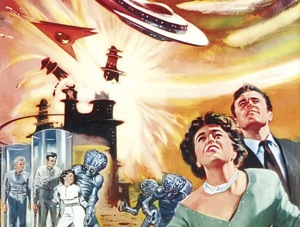
Directed by Joseph M. Newman • 1955
More successfully than any other ’50s science fiction movie, This Island Earth burrows deep inside its pulp source material. You get the sense that every technician at Universal-International was a paperback devotee, devouring boys’ adventure magazines and comics devoted to radios, rockets, and intergalactic conquest with the same alacrity as the kids themselves, fashioning a wondrous Formica-and-steel light show that keeps the spirit of the stuff totally intact. The story itself is pure juvenile urgency: hunky Rex Reason assembles a mysterious telecommunications device as if it were the greatest model train set ever and finds himself invited to hobnob with fellow scientists at a top-secret research facility in Georgia. He and ex-lover Faith Domergue suspect that all is not as it appears, and, insofar as they’re chumps propping up the military-industrial-complex of the distant planet Metaluna, they’re quite right. Like a free-form Cold War allegory staged with action figures, This Island Earth nevertheless retains, in the words of its most eloquent defender, Raymond Durgnat, “a genuine charge of poetry and of significant social feeling. It’s not cliché; with its sense of inner tensions, of moral tragedy, it’s myth.” (KW)
87 min • Universal-International • 35mm from Universal
Cartoon: “Dancing on the Moon” (Fleischer Color Classic, 1935) – 16mm – 7 min
Wednesday, April 24 @ 7:30pm
CONVOY
Directed by Sam Peckinpah • 1978
A two-fisted, tender, and explosive answer to the inexplicable trucking craze that overtook the better part of the country in the mid-’70s, Convoy was the second-to-last feature of director Sam Peckinpah, and his first and only attempt at a box office hit. Shot almost entirely in New Mexico, Convoy is an odd mix of lonely expanses of highway, tightly executed action sequences (including the best 18-wheeler explosion you’ve ever seen), and Captain Marvel-esque plotlessness. Kris Kristofferson is Martin ‘Rubber Duck’ Penwald, who leads a mile-long convoy of truckers in a meandering diesel-fueled protest to corrupt highway-cop Ernest Borgnine; Ali MacGraw is the wedding photographer whose car breaks down and takes up with the Duck and his band of outlaws. For a film simultaneously selling out its director’s reputation and cashing in on the 1975 song of the same name, Convoy is one of those rare films that manages to be weirdly moving and simultaneously kick-ass. Kristofferson gives a performance as listless as James Taylor and Dennis Wilson in Two Lane Blacktop, and he emerges as heroic as Errol Flynn, but the trucks steal the show. (JA)
110 min • EMI Films • 35mm from Park Circus
Cartoon: Popeye the Sailor in “Cops Is Always Right” (Fleischer Studios, 1938) – 16mm – 7 min

